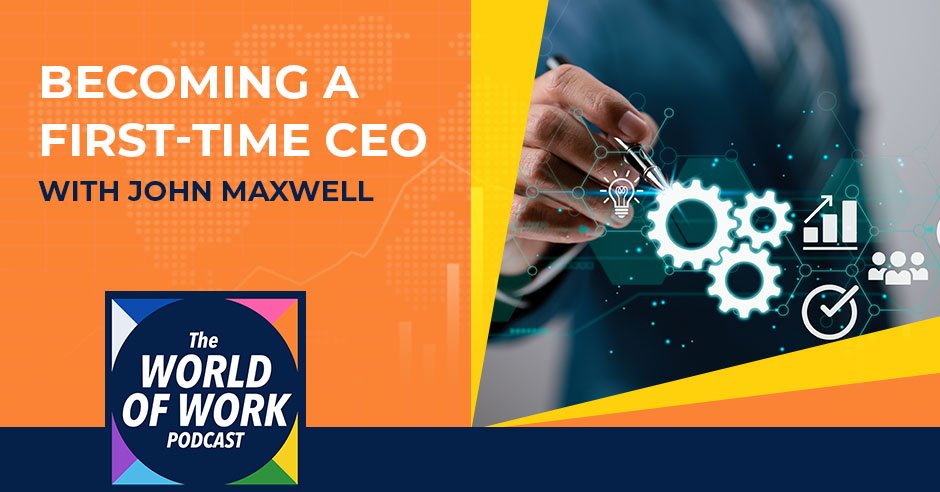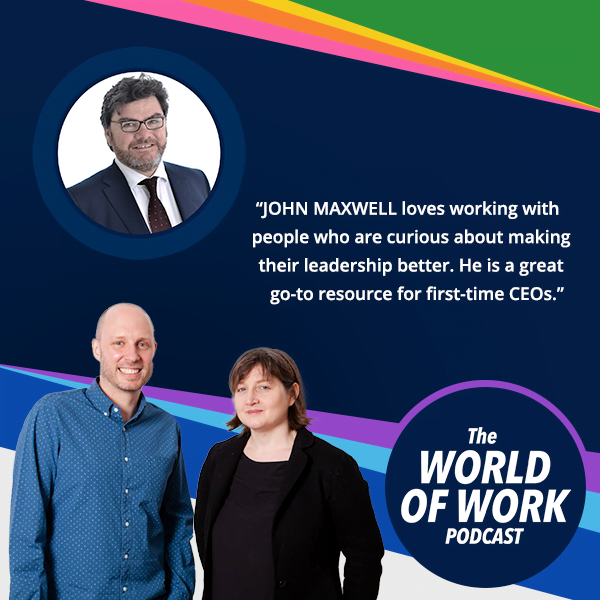
Are you afraid to step into a bigger responsibility? You don’t have to! In this episode, John Maxwell, an Executive Coach, shares his journey into transitioning into his first role as a chief executive officer. The moral compass in stepping into the role is the big takeaway in leading and running an organization. It is the determiner of achieving success. In this conversation, John points out the importance of standing for something and aligning the teams. Step out from fear of taking a huge responsibility and learn to navigate as a first-time CEO with John Maxwell today.
—
Listen to the podcast here
Becoming A First-Time CEO With John Maxwell
In this episode, we’ve got something I’m excited about. We’ve got a friend of mine called John Maxwell. He’s going to be with us for two episodes. We’re going to be talking about two interesting things that are connected. First of all, we’re going to talk about what it’s like to transition into your first role as a chief executive so that’s episode one. The second episode is going to be talking about what it’s like to transition out of being a chief executive into whatever comes next. John, welcome to the show. Before we get into the conversation, could you introduce yourself and say a bit about yourself and your background?
James, I’m happy to be here. It’s nice to be with you. John Maxwell grew up in Scotland. I have been lucky enough to have a career around the world. I started as an engineer in the industrial world and that’s where I made my career. I took on my first GM role in the US. I had a variety of P&L, general management, MD and CEO roles for many in various places. I left the corporate world in 2017 and have been spending my time as an executive coach. I had a couple of tries at some little techie startup stuff, which was a painful experience but I learned a lot. That’s where I am.
Thanks, John. What a rich background in history. You talked about a variety of senior roles and locations as well. That’s interesting to bring to the conversation. If we think about that first process of the first time you become a CEO and you step into that more sole multifunctional leadership role, I wanted to ask as an opener, how did it feel the first time you thought about that or the first time you were asked if you’d step into a role like that? What was that like?
I remember it well. It was in Connecticut. The global CEO was visiting for our quarterly review. We were at the hotel and he pulled me over. My boss, who was the person that ran the US, told me, “He’s going to be stepping out and doing something else. We’d like you to consider taking on the role.” My first reaction was this big knot in my stomach. I don’t know if I want to do that but I do want to do it and I pushed back. My first reaction was to say, “How about we wait for six months?” That probably surprised him.
It’s a fearful conflict. You talked about you’re not sure if you want it but you do want it. That space of uncertainty must have a common response.

I knew that I wanted it. It was just a case of, “Do I want it now?” It’s the feeling of the weight that has on. It was not a huge business at that point. It was 100 people but at that time, that felt a lot. It felt like a huge deal.
Do you think one ever feels ready for that? Do you think you ever feel quite ready for that moment?
If you’re in a bigger business where you see it more often or your peers are being promoted, they’re stepping into bigger roles and you have some connections and discussions, that can help. If you’re in a business that’s a little bit more separated, it’s a challenge. The first time, it’s going to be a fun challenge but a challenge.
Sometimes, we need to jump before we feel 100% ready otherwise. If you think back to the moment that you moved into that role, did you have a sense of who you wanted to be as a leader when you went into that role? Is that the person that you wanted to be by the time you left that role?
We’ll talk about some of the other roles that I’ve taken on a little bit later but that very first role for me, I did have a reasonably clear view on what the business needed, which helped. There was a clear direction. To some extent, there was an acceleration of what had been going on. That was quite helpful and there was a team. There needed to be a few changes but the team was pretty competent and in place. It was a steady and stable situation.
In terms of your approach to your interactions with people, were you planning on emulating somebody else’s later? Did you have things that you wanted to change to the way things were done or the way that you worked as a person or anything? What were your thoughts?
Let me talk about the second role that I came into because that’s maybe more relevant to people that are reading. The first role was about continuing what had gone on. The second time I stepped into a role, it was a bigger role. There was a need to change direction. There was a new team. A number of them didn’t know me and I didn’t know them.
The first thing was to try and get to know the people and understand them as people before plowing into the strategy, how we’re going to change things and what needs to happen. My first reaction was, “Here’s the group of people. How do we get to know each other a little bit so we can have those conversations that are going to be meaningful so we’re not just operating at the surface level and saying what each of us wants to hear?”
Get to know the people and understand them as people before plowing into the strategy and how we’re going to change things and what needs to happen.
That move away from transactional and connecting with people. For you, when you think about your position in leadership, do you think it was important to have a clear moral compass, leadership philosophy or underlying set of values that helped you be who you were in a leadership role?
I don’t think I didn’t have those when I first stepped into a leadership role. I was in the early MD roles. I was driven by what’s our annual targets and how we deliver the results. That was the driving factor and most other things were below that in order of importance. A big change for me happened in 2010. I had the chance to go to Harvard Business School. I spent seven weeks in this AMP program, Advanced Management Program. It’s a privilege to be able to do that. I managed to talk my global CEO into letting me do that and paying for it, which was a real opportunity.
What that allowed was the time for a bit of reflection that I’d never had. You’re so busy doing things that you don’t have time to step back. It introduced all this new information and data sources, whether that was from the program itself or the 150 other leaders from all over the world that were there. That was a real chance to see what good looks like and benchmark yourself against these other people that are running businesses all over the place.
To your point, you mentioned the moral compass. Spend some time thinking about what are the bits around behavior that make a difference. For me, that was a big part of my takeaway from that. Also, for my classmates, it was a big part of them too. It was quite interesting that all these people are running businesses and we all show up. We learn how to run businesses better in the program but the big takeaway for a lot of us was the piece around, “What’s our North Star? How do we make decisions? What do we think about the other factors, not just how do we increase the bottom line?”
It sounds like a wonderful experience. I love the peer-based learning nature of what you speak about there. Also, the opportunity to gain insight from different people with different views and experiences. Something I sometimes see with people is that they’ve been successful in their careers and they get somewhere. They’re fairly certain about what’s got them here and how to do those things and then they step into a new place.
It feels like there’s a need to reduce some of that certainty and recognize that maybe there are other ways, new ways or different ways and still maintain confidence in your ability to navigate but to hold on to openness to new things and embrace some of that uncertainty. That feels like a challenging thing to go through as a person, potentially. You’ve been such a success. You got here and performed well. Suddenly, you’ve got to do different things in different ways. Maybe you don’t have all the answers. How does that feel to be uncertain about that?
It can make you better. One of the things you see is where people have moved up within the same organization. They bring that legacy with them. They think they already know what’s going on. They’re less curious. I observed that they can be less successful in that. Whereas, if you’re taken into a new context, you come in from the outside. You don’t know any of the people. The ownership of the business or the shareholders may be different. It may be a different culture. I moved from running a UK-based business.
Although I was based in the States and China, the leadership was UK-centric. I moved from that to a global business that was French-centric so the leadership was very French. It was a different situation. It means that, back to my original point, you have to take a little bit of time to think, “How am I going to show up? How is this going to work? What do I need to do? What are the things that I don’t know?” There’s a bit more humility that comes out in those situations. Whereas if you’re on a straight line progression through the organization, you’re moving up, running a bigger business. The risk is that you can feel like you know too much already and not take the time to reflect.
I was at a conference and somebody shared a quote. I’ve grabbed it because I like it. It’s relevant to this. I’m not exactly sure how but it’s a quote from Socrates. It says, “To be uncertain is to be uncomfortable but to be certain is to be ridiculous.” Stepping into unknown places questions our certainty but when our certainty is questioned, it forces us to think about things and look, find, create, innovate and learn all those things that feel like lead to often better outcomes for us and those around us.
In bigger businesses, if you’re the leader, the CEO, the MD or the president, you’re no longer the person that knows the most about specific topics. You’re no longer the expert in sales, innovation or operations and supply chain. You have members of your team that know way more than you do about what’s going on in the organization. What does that mean? Where does your value come from? How do you bring the value up?
One of the ways that you bring value is by supporting and connecting the team. The other way you bring value is by translating and protecting, sheltering the team from all those external factors, whether that’s shareholders or the things that are coming into the organization that can cause disruption and allows your team to get on with what it is they do. That can be quite difficult sometimes.

First Time CEO: One of the ways that you bring value is by supporting, connecting the team, translating, protecting, and sheltering the team from external factors.
I imagine it must be very difficult to go from being the smartest guy in the room in your field to when you step out of your function, as most people progress from maybe a functional leadership role to a multifunctional leadership role. Moving away from a domain that is your maybe domain of expertise and suddenly, being in that space where you’re not the smartest in the room or the most well-informed. That’s not your role.
Your role isn’t to be the smartest person in the room because your role is those other things that you spoke about. It feels to me like it’s probably, for some people, a bit of a difficult personal transition to let go of being an expert in your area and embrace that space of being dependent on others. How did you find that?
I never thought I was the smartest guy in the room so it was quite easy most of the time. I didn’t struggle with that bit too much. What I struggled with was, shouldn’t I be doing more? Shouldn’t I be busy with projects and have lots of emails and be doing all these things? What I found was you’re saying the same thing over and over again to different groups of people.
You’re giving them time to talk to you and you’re listening. When you’re listening, you’re thinking, “Am I adding value here? How am I contributing? How am I getting stuff done? Are we moving things forward here?” You go from delivering in your previous role to a very different place where you’re saying some of the same things over and over again to the point that you think, “This is ludicrous. Doesn’t everybody know this?”
You ask people and they don’t know. You’re asking questions and listening to the answers, looking for insights and trying to understand what that informs you about where you are on your journey as a business. What are the things you need to focus on? What are the areas that need more attention? What’s going fast? What’s going slow? It’s a very different position to be in. Making that transition is a challenge.
The way you describe it, I can imagine moments of feeling a little bit empty. If you’re used to being active in a role and doing, then your role shifts to something else. I can imagine it feels like, “Am I missing something? What’s going on?” How do you manage that as a person? How do you give yourself reassurance that what you’re doing is valuable and helping you?
You get feedback from your team. You find out from them what support they need. How can you be useful to them? Where do they need you to show up? That’s one place. Maybe the other place is to be connected more broadly with the organization. Be present, whether that’s visiting sites and locations, town hall meetings, addressing feedback that comes in all its various forms and being present in the organization. Not just sitting in your office and worrying about the shareholders all the time. Spending time with the people in the organization or certainly having a balance around doing that.
It feels like that presence is an important thing. One of the functions of leadership is to be that conduit and visibility. If we think about your journey, particularly as you stepped into more senior roles, what were some of the other challenges that you faced? What were the things that felt difficult moving into those roles for you? What did you have to do differently or let go of that got you successful in those roles?
We talked about not feeling like you have to be driving everything and being busy on those topics, being willing to step and thinking a bit differently. That was the piece that allowed me to get to a place where I could move the businesses forward. There are two biggest challenges. One was moving to Europe and running a European-centric business. I’ve never lived in Europe. It was a historic business. It’d been there for a long time. Everyone had some strong ideas. It wasn’t very successful when I took it over. Being able to bring those people together, I would say that’s the number one thing that made the business successful over the years.
One way of doing that is by creating a common language or something that people can get behind. You can certainly have an initiative overload. That’s for sure. As a new leader in the business, you’ve got to stand for something. One of the things that you can stand for is putting a brand on what it is that you’re trying to do and then aligning the teams around that. In the context of the business that I’m talking about, we rallied around this play-to-win concept. The businesses have been around for quite a long time. They were leaders in some markets but there was this degree of victim mentality a little bit of things are happening to us.
I brought them together and focused around, “What do we need to be doing to play to win in this concept?” I brought 60 people together for 3 days and dived into that. Those three days changed the way that business operates. I still see people from those businesses. That happened in 2012. They still talk about it. It’s things or events like that that if you’re willing to invest and give them a try can make a big difference.
In terms of finding the inspiration and navigating through reaching that as a destination for actions and things you can do, did you do that on your own? Do you get support moving into that role? What’s the process like of getting there?
You need support to do it on your own. It’s a challenge. Maybe you get better at it if you do it again and again but support, whether that’s mentors, coaches or other CEOs that you’ve admired or come to know through associations. I found that people were very generous with their time. If you call people up and say, “Could we have a chat about this and help? Here’s the situation. I’d love your ideas and opinion,” you’d be amazed at how much time people will give you and what they’ll share with you so don’t be shy.
As well as finding a mentor or a coach whom you can work with and whom you can have those conversations with. I had three different ones around that time and they helped in different ways. It initially felt a little strange reaching out and saying, “I’d like some help as a coach,” for you to come and ask me all these hard questions because it felt a little bit vulnerable. After the first session or two, I’m like, “This can make a difference.”
I was curious about that. It feels like to be successful in moving into that new space, as you describe it, you need to open up to being challenged and be able to listen and try new things. You talked about vulnerability there. Thinking about what you’ve done, is there anything that you did that made it easier to let go of the things that maybe held you back from being in that learning space or is it a matter of choosing that to be the case? Is it experience? What helps you embrace that ability to learn and feel you don’t have the answers?
For me, it was moving into a new space. In other words, people have some idea about who I am but I don’t bring all that legacy baggage with me. I can be whoever I want to be. I show up. It’s a new day and this is all about me. They don’t care.
This is all about you. That’s part of the growth process to become a leader. It’s about us as people.
This is all about my willingness to show up and try out some new stuff. Also, being willing to be vulnerable and recognize that I don’t know those answers. I found that much easier to do when I was in situations or in new rules where people didn’t know that much about me. Maybe that’s because I don’t know where that interesting idea comes from.

First Time CEO: Be willing to show up and try out some new stuff. Be vulnerable and recognize that I don’t know those answers.
It’s a curious thing. It feels like for you moving context. Being in a place where maybe people didn’t expect you to know the answers made it easier for you to behave in a way where you could be in that learning space because you didn’t have that baggage. It feels like such a valuable space to get into as a leader. I feel that sometimes we think that leaders should know all the answers but the styles of leadership we’re speaking about is about something much more.
There’s a development journey and there seems to be a real personal journey to go through as well to be comfortable in that space of facilitating, enabling, mentoring, helping, setting direction and all those types of things. Do you think your appreciation for the role of leadership grew over your time in leadership? How did you realize that?
I grew over my time in leadership. In my first couple of MD rules, I was much more impulsive. If people weren’t working out or weren’t getting things done, I was like, “Change the people. Let’s get moving. End of the count.” I made some terrible decisions back in those early days. Coming back to the Harvard experience, the seven weeks to think about stuff made a big change in how I thought about leadership. That was one of the seminal experiences for me. It felt like I had more information. I had different ideas. I knew more.
I wasn’t just going on what I’d seen before. I wasn’t going on, “This is how this is supposed to work so I’ll replicate that.” I was thinking about who I want to be as a leader. What do I want to do? How am I going to handle this? How do you handle tough situations? That’s the other big piece around leadership. People are looking at you to see how are you going to handle an underperforming team member, behaving badly and being disruptive. Those are quite obvious. How are you going to handle a team member that’s quietly undermining the rest of the team and not saying very much? It happens to have a part of the business that performs pretty well. Their numbers are okay so how do you deal with those types of situations?
The insidious toxicity lurks in there. One’s approach to that emerges over time as you gain clarity on what’s right for you as a person. Does that seem fair? When you were talking about this time at Harvard, I scribbled down open and broader. It was time to reflect and grow in on yourself. Do you think your approach to those difficult situations emerges over time as you gain clarity on your values and who you are?
I knew what my values were. It’s maybe also about confidence. Your confidence to take that stand and say, “This person might be the highest performing person in the business from a financial standpoint but we need to talk about this because these are things that are holding us back as a team or these are things that don’t line up with the values that we’ve said that we want to operate on. Therefore, we’re going to have that conversation and maybe we have to change.” It takes a bit of time to grow into confidence and make those calls because many people in the organization will be looking at that call and say, “Why did that person change? Why did we change this?” They were great at what they did.
It must feel challenging, whatever level one is at, the first time one faces a new challenge like that. That feels like another real developmental step in there. If you think back a little bit to some of those early stages of moving in and preparing to move into a leadership role, what things do you wish you’d done differently at the start? What might you have done differently to help you navigate through that or move to those more senior roles more smoothly?
Getting a coach or a mentor sooner. Exploring the outside world a little bit more. Not just diving into the doing straight away. Why? Those things help you build confidence in yourself. Confidence in yourself means that you show up as the leader and that you want to be with the values that you have, as opposed to replicating or following what’s gone before.
Build confidence in yourself. Show up as the leader you want to be with.
One of the things that you touched on that we were speaking about a little bit and then you touched on there again is that makes space to be less active, more reflective and investing in your space to think and things like that. It’s hard to do that. If you take on that role, how do you navigate that early on in terms of the people appointing you to a role? How do you carve out space and permission for you to have that space to focus, grow and develop? How do you build that into what’s being asked of you in this type of role if you’re going to take one on?
In my experience, I was lucky and unlucky in some ways. The role was global so I was traveling a lot. I had lots of time sitting on airplanes so airplane time. I used to write pages of ideas and thoughts. For me, it was a space where I could come up with all kinds of stuff. It was a reflective space where I could think much more deeply about certain topics. A lot of those ideas were from planes and trains. I don’t know how during the pandemic people and CEOs lost all that space.
A lot of people went stir-crazy, didn’t they?
They went stir-crazy but also the space where they weren’t responding to people. Their calendar was full every day.
It’s interesting you spoke there a little bit about what I’d describe as reflective practice. How important do you think having that reflective practice is for successful leaders? What’s your view on that?
It’s critical for sure. If you’d said reflective practice to me years ago, I would have laughed at you. I wouldn’t have understood what you mean. It’s critical to do that. I’m an executive coach so I spend a bit of time helping people do that. It is a practice. I use the word practice, which means there’s a technique, which means you’ve got to know how to do it and there’s a lot in that. It’s not something we’re taught or maybe people put a lot of value on sometimes. It’s a little bit of a black box for people. They don’t understand what’s there and it is important.
One of the phrases that I sometimes hear in the smaller startup world when we speak to people is there’s a distinction between working in the business and working on the business. I feel that as individuals, as we develop, there’s probably a difference between working in our role and working on our role. Trying to get that balance between doing what needs to be done and getting better at doing what needs to be done, challenging, self-correcting and doing that feels like an important space. That’s self-reflective practice. Coaching and going to things like your Harvard program that give you space are hugely important. It’s interesting to call those points out.
You have to do both. There’s no way anyone that’s going to be successful in a senior role. It’s going to do both of those. How much challenge is there for you as the CEO from the board of directors and the shareholders? What ambition do they have? Do they want to double, triple or quadruple the business? Do they want 10X? Do they want to take it to a different place? Do they want that piece? It allows the CEO to spend or have a bit of direction around what is it they need to be thinking about with regard to where the business is going. You need that external product unless you’re a true entrepreneur and it’s your business then you have to do that yourself.
As a CEO of a business with shareholders and a board, you should be getting quite a lot of that direction. Some, it’s up to you to push ideas and have your agenda but a lot of that comes down. When that doesn’t come down and that piece is missing for CEOs, that’s when they dive into the business. They came from the business so they know the business. That’s usually a comfortable place. That’s where they know how to do things.
You see that where you see the classic is efficiency and cost versus growth. It’s that easy to come up with a plan to cut people. “Let’s do this more efficiently. It looks great on PowerPoint.” They’re talking about, “How are we going to grow sales? How are we going to go to new markets? How are we going to do all these other different things?”
One of my favorite sections, I can’t remember the quotes but it’s from Barbarians at the Gate. One of the execs is saying, “Saving money is easy. I need to find somebody who can spend money. It’s all about how we spend money well.” What a challenge that is. That’s a super interesting thing and a different perspective on things. When you’re talking about working with a board or other external factors that are shaping who you are as an organization, here’s a little side comment.
One of my moments of realization was when I did something with an exec at some point. Up to that point, I’d always thought that the execs were the boss. I was like, “This guy’s a senior. He’s the boss.” You realize that in some ways, they’re a conduit to shareholders, institutional investors, funders and regulators. They’re in this stakeholder management role where they’re not the power.
It was an interesting insight for me to realize that the leadership role wasn’t about the executive direction all the time. It involved a lot of those other things that you’ve spoken about. If we think about your journey from when you first became a multifunctional leader to when you moved on, what do you think the skills are that you developed the most over that period? What changed in you or your approach or capability the most?
Patience, probably. As a new leader, I was much more impulsive. Also, willingness and desire to listen to what’s out there, whether that’s from the team, the business or customers. Also, try and use that to find the insights that we’re going to identify what are the key levers for the business. What’s important for this business? Is it about how we grow and enter new markets? How do we change our cost base because we’re uncompetitive and we need to move from here to there? Is it about we want to go through acquisition so how do we find and target these different businesses?
There are lots of different choices for you to make. It’s easy to pick the easy choice, which is, let’s ask the number of people we have and keep the sales the same because the profits will look great. It’s way more complicated than that. As I grew in my role, I was clear on what those different choices were and more willing to take on some of the more difficult ones and some of the higher-risk ones like acquisition, entering new markets or doubling down on innovation. Those topics where the risk of them going wrong is high.
It’s interesting some of those reflections about listening and patience. In my words, not words you use, less activist or less urgency in what we do. As you were speaking, I was thinking about the difference between signal and noise from a statistical perspective. The world is full of noise and if we respond to every noise, then who knows where we’ll end up? If we make space to try and find that signal and choose the signals that are right for our organization and us, maybe we can do a little bit better.
Also, role model and some of that for your team. If you’re a frantic leader, then the people working in your organization think that’s the mirror of what you do so you will create a frantic organization. If you’re a thoughtful reader, it’ll be a little bit more thoughtful. Recognize that you do cast a big shadow in those types of roles. Whether you like it or not, you cast that shadow. If you have a small ego, you cast the same shadow. If you have a big ego, it doesn’t make any difference to a great extent. You need to recognize that impact.

First Time CEO: You cast a big shadow in the roles you play.
Did you find that there’s a challenge around your whole self being perceived by others as a leader? Do you separate yourself as an individual from yourself as a leader when you’re in those roles? How do you manage that combination of being a visible person, being who you are and being so influential as a person?
I didn’t separate them. It didn’t feel like I could separate them. I’ve always been someone who is curious about people and likes to connect with people. Hierarchy, status and all these types of things don’t mean that much to me. I like to connect with people at that person-to-person level. I didn’t separate it. I see a few leaders that do that, for sure and have a small inner circle of people that know them and people that are outside of that circle don’t have a view. I didn’t operate that way. I don’t know if that’s right or wrong but that was certainly my approach.
I don’t know what’s right or wrong or if there is a right or wrong in this. I do get the sense that if you are pretending to be something that you are not in a role of this nature, that can take a big burden on yourself and your well-being. The emotional labor of projecting something that isn’t a reflection of who you are can be a difficult thing. It sounds like that’s something that you didn’t do. It sounded like you were yourself but have you got any reflections on that projection of a false self as a leader?
I don’t think it’s sustainable. You get found out or it isn’t credible after a period of time because people will get to see who you are. You’re better off to start from that point of view. The biggest difference I had in that situation was my last CEO role when I joined a French business. I’m part of their diversity program, a non-French CEO in their group.
I was very different from almost all my peers. We’d go to the senior, the annual get-together, twelve people in the global business. There was me and one other foreigner and everyone else was French. Everyone else was male, pretty much. I enjoyed the bit about being different in that situation because it allowed me to be whatever I wanted to be or be who I was without feeling like I was going to be judged to some extent. It created quite a lot of freedom for me.
That opens up an entire conversation about inclusion that I don’t think will go down, though I know that you’re hugely passionate about it. Creating permission for that is interesting but we’ll potentially come back to that as another conversation. In the interest of time, I’m going to wrap us up. If you had 1, 2 or 3 little takeaways for somebody who’s about to transition into their first super seniors or the multifunctional leadership role, what would you recommend for them? What are the starting points of advice for somebody who’s either in this role or about to be there?
Set high expectations. That would certainly be one of those things. More seriously, make some space for reflection, whether that’s with a coach or by going and doing a program where you get different inputs from different people and you see different things. Especially if you’re going to be staying in the same or similar organization, dealing with the same people. Go get a different experience that’ll give you a little bit of space and a lot of different inputs. That’s number one.
Number two, if you’re stepping into that role and you are the senior leader, the point about recognizing that what got you there is not going to be what makes you successful. You need a set of different skills. Your expertise is no longer the thing that you’re trading on. You need to be filling up that basket with new skills and collateral that’s going to make you a successful CEO.
The third point would be to get to know the people. I spent three years in China. I spent a lot of time working in the Asia Pacific. They have a strong notion around before we talk about business, we get to know the people, who you are, what you stand for and get to know who the people you’re dealing with. Be curious. Go straight in with what are your three top ideas for how we can make more money. You’re going to get to that question because that is an important question. If you want them to tell you what their three ideas are as opposed to what they think you want to hear, then invest a little bit of time to get to know them on a personal basis. Those are probably my top three.
Staying open to developing and broadening our inputs around us, being clear that what got us here won’t help us succeed in that role, finding new things that fill up our basket, connecting with people and getting to know people. They sound like some great starting pieces of advice. We’re about to finish. Before we wrap up, how can people find out more about you and what you do?
Stay open to developing and broadening our inputs around us. Find new things that fill our basket, and then connect and get to know people.
I work with a partner. We have a little consultancy called Samsas. You can find us at Samsas.one. We do team individual leadership development coaching with an inclusive leadership lens or focus all over the place across lots of different sectors. We enjoy working with people that are curious about getting better at leadership.
That’s Samsas.one and we can share the details when we publish this. It’s time to say thank you so much. It’s been a pleasure. It’s wonderful to see you. Thank you.
Thank you, James.
Important Links
- John Maxwell – LinkedIn
- Barbarians at the Gate
- Samsas.one






